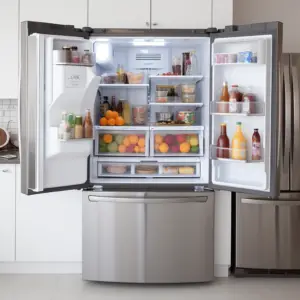LG Refrigerator Problems, LG is one of the best brands known for quality and reliability. With over 50 years in business, LG has a reputation for making durable products that earn the trust of consumers. However, even the most reputable companies have their problems. As technology advances, even appliances made by companies like LG can have issues.
Table of Contents
LG Refrigerator Problems

While they are some of the most popular in the world, LG refrigerators are associated with a few frequently reported issues that you might want to know in case yours starts to act up.
Note that this is just a general guide and it’s not directed to any specific make or model from the LG range. As such you might want to consult your owner’s manual alongside this guide for more successful troubleshooting.
LG Refrigerator Linear Compressor Not Working
LG constantly upgrades its appliances with cutting-edge technology. The brand is working on the linear compressor, which is now in several models.
Linear compressors’ ability to kick only on purpose makes them more energy-efficient than older models.
That said, many LG users have reported that they experienced issues with their compressors. The most common reason for this problem is a faulty seal, which can keep the compressor from being able to operate as expected. So, if you realize that your appliance is running but not cooling, chances are there’s a problem with the compressor. When this happens, you may have to call in a licensed technician to have LG Refrigerator Problems repaired for you.
LG Refrigerator Not Cooling
Although LG fridges are incredibly popular and are found in many households, they don’t have the best cooling capabilities. In fact, there have been complaints from customers that their refrigerators stop cooling completely.
Note that for your LG refrigerator to cool down and stay cool, there are many different components that need to work together. In case one or more of these components are faulty or stop working, then the entire appliance will stop working altogether. You will need to have an idea of the symptoms and issues of the appliance to trouble these issues.
A Faulty Compressor
If your fridge isn’t cooling properly, it might be an issue with the compressor. This is a quite delicate set up and therefore issues or faults with the compressor can prevent the refrigerator from operating and cooling as expected. In most models, the compressor is located at the bottom of the back of the fridge. That means you will need to remove the back panel to access the compressor.
In case you’re not sure how to do this, consult your owner’s manual or have a licensed technician take a look. You should hear a running or humming noise if the compressor if the fridge is working properly.
Faulty Start Relay Fault
LG Refrigerator Problems having trouble with your fridge’s compressor, it could be due to a faulty start relay. Luckily, this is an easy issue to troubleshoot; you just need to test the relay’s continuity.
To do this, start by taking off the back panel of the unit so you can access the relay from the bottom. After locating the relay, proceed and test it for continuity using a multimeter. If there is no continuity, you’ll need to replace the relay.
A defective Condenser Motor
If your fridge starts making strange noises or overheating, or your energy bills start to go up, it might be time to check your condenser motor. Start by checking the condenser coils for debris or any buildup that could be interfering with the fan blades.
If there is radically reduced airflow, your refrigerator and freezer could end up shutting down. If you’re still facing problems even after cleaning off the coils and ensuring that the fan blades are free to spin, then it could be due to a faulty compressor motor, so consider replacing it.
Faulty Evaporator Fan Motor
The main role of the evaporator is to circulate cool air from the freezer into your refrigerator. If you notice your fridge isn’t cooling properly, it might be a sign that there is a problem with the evaporator fan motor.
Before you start troubleshooting or calling a repairman, you should start by ensuring there is no buildup or clogs that are preventing the fan from spinning. You should also ensure that the motor is running freely and remove any debris or buildups by vacuuming it.
LG Refrigerator Leaking Water

One of the most prevalent fridge issues is water leaks, which are never good. When the fridge door is closed, water seeps. In most circumstances, you can fix a leaky fridge with a few steps.
Clogged/frozen drain line: Leaky fridges are problematic for several reasons. Water can harm the cabinets below the fridge and pour onto the floor if it overflows. Check your refrigerator drain for freezing or clogging to avoid this. If clogged or frozen, melt ice or remove debris with hot water.
One of the main reasons of interior leaks is tank assembly failure. Check for leaks and replace broken parts quickly. This includes your water inlet valve, housing, and other items. Check for cracks and replace broken parts immediately.
Resetting an LG Refrigerator
If you run into any common issues with your LG fridge, or any other issues, it can be helpful to know how to reset it. First, open the fridge doors, then press and hold the refrigerator and ice plus buttons at the same time for five seconds. After five seconds or so, the panel should begin to blink, which means your fridge has been successfully reset.
